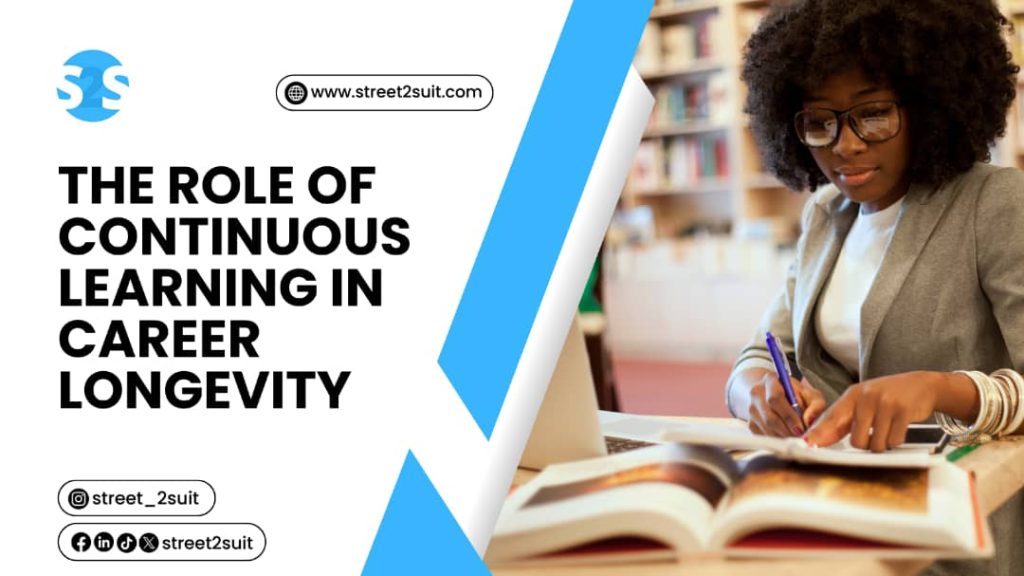Why You Should Keep Evolving Like a Software Update…
Let’s face it—life doesn’t come with a manual. No one handed you a user guide on how to climb the career ladder, avoid office politics, or keep your inbox from becoming the digital version of Mount Everest. But, if there’s one thing that can keep your career from getting outdated like a forgotten app on your phone, it’s continuous learning.
If you’re aiming for career longevity, you need to constantly upgrade your skills, just like how your smartphone gets a new operating system every year. Imagine if you never updated your phone’s software—your Instagram might freeze every time you scroll, and your battery could last approximately five minutes. The same thing happens when you stop learning: your career might become slow, outdated, and irrelevant.
Here’s why continuous learning is essential for your career longevity. And don’t worry—we’ll keep it light and engaging because, let’s be real, career advice doesn’t have to feel like a Monday morning meeting.
1. The Future Doesn’t Wait for You (And Neither Does Your Career)
The world doesn’t stop turning just because you think you’ve learned enough. If you’re not evolving, there’s someone else out there who’s building a new skill set, innovating, and learning something that could leave you in the dust. It’s like that moment when you realize everyone at the office has switched to a new coffee brand, and you’re still stuck with that sad, expired bag of beans in the corner of your cupboard.
Staying relevant in today’s fast-paced world requires you to stay ahead of the curve. Whether it’s taking up a coding class (even if you have no idea what HTML stands for), learning a new language (because “Parlez-vous français?” could be the key to that promotion), or mastering the latest AI software (because that’s the future, and you’re going to dominate it), continuous learning keeps you in the game. It helps ensure that you’re not caught off guard, like that guy who still doesn’t know how to turn on a Zoom meeting
2. You Don’t Have to Be a “Expert”—Just Keep Getting Better
You don’t have to aim for the title of “Master of All Things” (unless you’re into that, no judgment here). But you should be striving for incremental improvement. Think of it like working out: You don’t need to bench press 200 pounds on your first day at the gym. But if you keep lifting those metaphorical weights (whether it’s through courses, certifications, or reading up on new trends), you’ll gradually get stronger in your field.
Career longevity isn’t about mastering everything at once; it’s about consistently improving and evolving. It’s about being willing to take that class on project management even if you already have a degree in it because there’s always something new in the world of management. Or maybe it’s about learning how to use new software because that one project is going to need it. Even if your brain feels like it’s about to burst, remember that small improvements will pay off in the long run. You’re building your skillset brick by brick.
3. Keep Your Mind from Turning Into a Desert (The Dangers of Stagnation)
We’ve all met someone who hasn’t changed their hairstyle since 2005. No judgment, but if you’re still rocking that high school prom look as a grown adult, it might be time to update your wardrobe—or at least your mindset.
In the same way, a lack of continuous learning can cause your career to stagnate. It’s easy to fall into a routine, especially when you’re good at your job. But let’s be honest: the moment you stop learning, your career can start feeling like a treadmill you can’t get off. You’re putting in the effort, but you’re not going anywhere.
Without learning, your skills, knowledge, and approach to your job become as stale as last week’s pizza. If you’re not adding new knowledge to your mental toolkit, you risk becoming irrelevant, which is the career equivalent of trying to use a dial-up internet connection in 2025. The best way to avoid this is by embracing continuous learning. Keep seeking out new challenges, dive into new fields, or learn the latest industry trends. You’ll find that not only does it keep your job interesting, but it makes you more adaptable to change.
4. The Perks of Becoming a Life-Long Learner (Spoiler: It’s Not Just About Job Security
Okay, so let’s talk about some perks. First off, the more you learn, the more likely you are to be seen as an expert. You’ll become the go-to person at work for advice on everything from the latest tech developments to which coffee machine produces the best espresso (priorities, right?). This reputation can keep you at the top of your game for a long time, not to mention that it might make you a valuable asset to your company, possibly even landing you that coveted promotion.
Moreover, a willingness to learn new things shows your employer that you’re not just going through the motions—you’re engaged. You want to grow, and growth is what fuels career longevity.
And then there’s the obvious: learning makes you more adaptable, which is crucial. Change happens fast in the workplace. From new tools to organizational restructuring, it’s easy to get left behind if you’re not willing to learn how to handle the new realities. Embracing change, even when it’s difficult, will ensure that you stay relevant and resilient
5. Get Comfortable with Being Uncomfortable
The best way to learn something new is by getting out of your comfort zone. Look, I get it—sitting back and relaxing in your cushy little corner of “I’m good at this” feels like a haven. But guess what? Comfort zones are the graveyards of careers. If you’re not challenging yourself, you’re likely being passed by someone else who is.
If you’re not sure where to start, think about areas that seem a bit intimidating. Maybe it’s public speaking. Maybe it’s the latest design software that’s been buzzing around the office. Or maybe it’s learning how to navigate LinkedIn like a pro. Whatever it is, start there. Yes, it’ll be awkward at first. Yes, you’ll feel like you’re bumbling through a new language. But eventually, you’ll see results. And let’s face it, being uncomfortable for a while beats the alternative—being outdated and irrelevant.
6. The Power of Networking and Peer Learning
If learning alone is good, then learning with others is even better. Networking is an often underrated part of career longevity, and it doesn’t always mean attending stiff corporate events. It’s about exchanging ideas and knowledge with others in your field (or outside of it). When you surround yourself with other like-minded learners, your career will grow exponentially.
Look for peers who are passionate about their growth. Collaborating with colleagues on a new project can expose you to fresh perspectives and new tools. Who knows? You might learn something that completely changes the way you approach your work. And no, it doesn’t have to be a formal class—just a chat about the latest trends in your industry could give you the edge.
7. It’s Not a One-Time Thing (Learning is a Marathon, Not a Sprint)
One of the biggest misconceptions about learning is that it’s something you can do once and then be done. Think of your career as a marathon, not a sprint. Continuous learning is the fuel that keeps your legs moving and your brain in the race.
Don’t think you have to cram all the knowledge in at once. Small doses of learning throughout the year will add up. Whether it’s reading articles, attending webinars, or picking up a new skill, it all counts. And while it might seem like a lot of work upfront, the long-term benefits will make it worth it.
Conclusion
The role of continuous learning in career longevity is pretty straightforward: keep learning, and your career will keep going strong. It’s not about being perfect; it’s about staying relevant, adaptable, and enthusiastic about evolving. So, the next time you feel your career plateauing, pick up a new skill, take an online course, or just try something outside your comfort zone. After all, the best careers aren’t built by avoiding change—they’re built by embracing it. Keep learning, and your career will thank you for it!
Receive the latest job and career updates in your inbox, every week!




